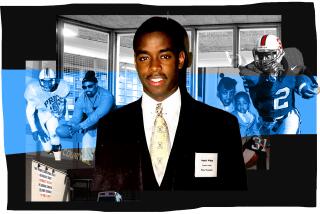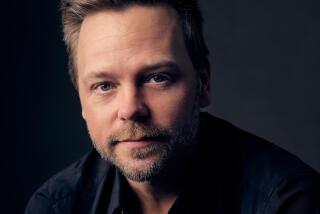The Big Questions Come Naturally : Pulitzer Prize-Winning Sociobiologist Edward O. Wilson Casts His Lofty Gaze on the Global Anthill and Says Humanity Can Do Better
CAMBRIDGE, Mass. — Go to the ant . . . consider her ways and be wise.
--Proverbs 6:6
*
He bends over the wooden drawer with the delight of a wine connoisseur in a cellar of Margaux.
The drawer contains ants: 400 specimens, each mounted on the point of a tiny paper triangle pierced with a mounting pin and inscribed with ant-size writing detailing its genus and species.
Lining the room behind him stand 85 gray cabinets holding 1,345 similar drawers containing in all some 538,000 ant specimens, not to mention another 300,000 ants in alcohol awaiting classification.
For some people, acquiring intellectual domain over 838,000 anything might seem the ambition of a lifetime. But ants are just where Edward O. Wilson begins. Not content with merely organizing the entire global anthill, the famous Harvard myrmecologist, zoologist and Johnny Appleseed of sociobiology has taken up organizing the anthill of all human knowledge.
In his stunningly ambitious new book, “Consilience: The Unity of Knowledge,” he argues that evolution is pushing us to bridge the gulfs separating the thinkers and the technicians who toil dronelike in the disparate intellectual enclaves of modern society. Sculpture, nuclear physics and even religion, he says, are really branches of biology these days. They need to be searched anew for their commonality: as spiritual levers from the same evolutionary toolbox that lifted man from the mud.
“Ants have to specialize,” he says. “They only have a million brain cells and need every one to set up an instinctive repertory and do things by the numbers. . . . But we humans have 100 billion brain cells. We can do a lot better.”
*
For Wilson, 68, the obligation to “do a lot better” has been a tireless intellectual and spiritual quest. “Consilience” (the word means the synthesis of disparate facts into a coherent whole) is merely the latest scholarly adventure in a career that has made him one of the nation’s most provocative thinkers. He arrived at Harvard 40 years ago a lanky, bespectacled ant collector and naturalist largely self-taught in the woods and marshes of his native Alabama. Since then he has not only co-authored a poetical, Pulitzer Prize-winning encyclopedia on the essence of ants, but written or co-written 22 other books and 351 scholarly articles. In the process he has helped revolutionize basic assumptions about the essence of humanity and human society.
Twenty-three years ago, after publication of his landmark work, “Sociobiology: The New Synthesis,” he was doused with water at a meeting of the American Assn. for the Advancement of Science by leftist protesters livid at his suggestion that our behavior lies rooted in our parents’ genes as well as their training.
“Wilson,” the demonstrators chanted, “you’re all wet!”
Today, sociobiology is not only an accepted branch of science but one of its driving forces. The Animal Behavior Assn. in the 1980s voted Wilson’s once-controversial work the most important such book ever.
But today, Wilson says, it is possible to go still further. Tremendous advances in biogenetics, neurocellular biochemistry and environmental biology make it possible to glimpse not just how the brain functions, but the workings of the mind itself.
We’re almost at a point, he says, at which we can answer with some confidence the great overarching question of human existence with which philosophers and theologians have struggled for ages and behaviorists have grappled for most of this century: Who are we? Where did we come from? How do we determine where we are going? Is our existence as a species predetermined or are we masters of our own free will? Are we shaped by genetics or by culture? By nature or nurture? By accident or divine plan?
*
Wait a minute.
Isn’t this an awful long way from the anthill? Isn’t he flying pretty close to the sun--prodding questions of ethics and existence and divinity with an entomologist’s divining rod? Isn’t this the definition of hubris?
“Exactly!” Wilson says with a small smile of satisfaction. “And that is humanity’s saving grace. It is that vaulting ambition of man that has always pulled me to the myth of Icarus and Daedalus. We are always called to reach higher. And if there are other beings watching us from afar, I believe they can’t help but admire that quality in us the most. Otherwise we’re just slaves to ideology and religious belief.”
Thanks to science and technology, access to factual knowledge . . . is destined to become global and democratic. . . . What then? The answer is clear: synthesis. We are drowning in information, while starving for wisdom. The world henceforth will be run by . . . people able to put together the right information at the right time, think critically about it and make important choices wisely.
--From “Consilience”
Wilson’s circumspect manner disguises a tough-minded individuality and tireless drive that he dates from a not-always-happy Alabama childhood that included a year in military school at age 7. Blinded in one eye by a boyhood accident and hard of hearing from birth, he studied insects because he couldn’t see and hear birds. The only child of divorced parents, he sought refuge in work and ambition.
*
He is, he confesses, a “congenital synthesizer,” always looking for common patterns that point to unifying theories of life and society.
One of Wilson’s big advantages as a thinker is that he has literally worked his way up the food chain in his efforts to probe the nature of existence. He has trekked after ants from Brazil to Sri Lanka.
From ants he went bug-wide to “The Insect Societies” (1971), then, in light of modern evolutionary theory, took on the social behavior of other animals, from jellyfish and elephants to man. That led to “Sociobiology,” whose critics charged that Wilson might know a lot about animals but not much about humans.
Whereupon he immersed himself in the literature of psychology, sociology and anthropology to produce “On Human Nature” (1978), for which he won the first of his two Pulitzers. “Consilience” is the next step in his four-book argument that the implications of neo-Darwinist theory--the so-called Modern Synthesis--have made all human knowledge essentially branches of biology. The argument, according to Wilson:
Man does what he does, paints the pictures that he does, writes the books that he does, fights the wars that he does, thinks the thoughts that he does, primarily in an effort to achieve an evolutionary advantage that will allow his genes to live on in the future.
The dominating influence that spawned the arts was the need to impose order on the confusion caused by intelligence.
--From “Consilience”
Wilson’s roots in Southern Baptist creationism long ago surrendered to the “overwhelming” scientific evidence that life on Earth has been “self-assembled” in the messy but elegant aftermath of the “Big Bang” origin of the universe. The sociobiologist remains a “provisional deist,” he says, because he has no explanation for the Big Bang itself other than God. But at the same time, his “naturalistic” view of how biodiversity came to be leads him to believe that the “sheer complexity and majesty of it is in my eyes more awesome than the traditional creation story.”
*
Wilson glimpses divinity in all life. He sees the overarching purpose of human existence as stewardship of our earthly environment in such a way as to maximize the biodiversity that sends evolution on its way.
If the point of humanity is to aid evolution, then the purpose of the unity of all knowledge, he says, is to better understand and husband the unity of all life. And given man’s depredation of the natural environment that makes biodiversity possible, there is clearly a major resuscitation to do.
But there’s a further dilemma in “Consilience” that Wilson acknowledges contains “a whiff of brimstone”: man’s growing power to shape life through genetic manipulation.
Will we choose as a society a “brave new world,” where we manipulate our genes and our culture to predetermined ends, even as we now declare genetic war on inherited diseases? If we do, Wilson says, we will play as much havoc with human nature as we humans have with nature itself.
Meanwhile, back in the ant lab, Wilson is looking sleepy. He’s been up since 7, and it’s now late afternoon. Often by now he’s had a nap after a morning of writing and monitoring some of the 60 journals he takes, ranging from the New York Review of Books to Proceedings of the Entomological Society of Belgium. He lunches alone at one of five favorite restaurants in nearby Lexington, Mass., where he normally writes for two hours at a quiet corner table. Then he goes home to chat and do chores with his wife, Irene, to whom he’s been married for 43 years.
Sometimes the chats involve ants, which both Wilsons appreciate more in the wild than in the pantry cupboard. “I always tell people if they find ants in their house, they should observe them and be careful of little lives,” he says with a look of whimsy. “But the truth is when I find them in mine, I eliminate them.”
It’s not just that 838,000 ants are enough.
“They far exceed human beings in organized nastiness,” he writes in “Journey to the Ants.” “If ants had nuclear weapons, they would probably end the world in a week.”






